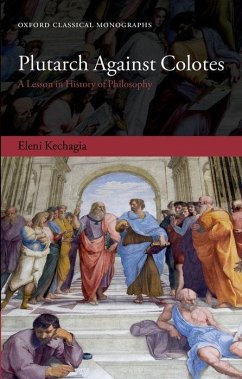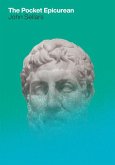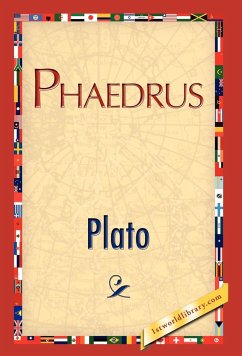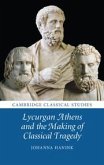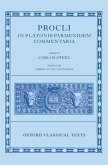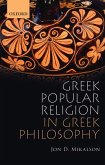- Gebundenes Buch
- Merkliste
- Auf die Merkliste
- Bewerten Bewerten
- Teilen
- Produkt teilen
- Produkterinnerung
- Produkterinnerung
Kechagia rehabilitates Plutarch as a thinker and historian of philosophy by offering a critical analysis of Against Colotes, an anti-Epicurean treatise in which Plutarch discusses some of the most important philosophical theories. The book argues that Plutarch produces insightful philosophical interpretations of past theories.
Andere Kunden interessierten sich auch für
![The Pocket Epicurean The Pocket Epicurean]() John SellarsThe Pocket Epicurean13,99 €
John SellarsThe Pocket Epicurean13,99 €![On the Heavens On the Heavens]() AristotleOn the Heavens34,99 €
AristotleOn the Heavens34,99 €![Phaedrus Phaedrus]() PlatoPhaedrus24,99 €
PlatoPhaedrus24,99 €![Lycurgan Athens and the Making of Classical Tragedy Lycurgan Athens and the Making of Classical Tragedy]() Johanna HaninkLycurgan Athens and the Making of Classical Tragedy126,99 €
Johanna HaninkLycurgan Athens and the Making of Classical Tragedy126,99 €![Phaedrus Phaedrus]() PlatoPhaedrus30,99 €
PlatoPhaedrus30,99 €![Procli in Platonis Parmenidem Commentaria III Procli in Platonis Parmenidem Commentaria III]() Procli in Platonis Parmenidem Commentaria III126,99 €
Procli in Platonis Parmenidem Commentaria III126,99 €![Greek Popular Religion in Greek Philosophy Greek Popular Religion in Greek Philosophy]() Jon D MikalsonGreek Popular Religion in Greek Philosophy195,99 €
Jon D MikalsonGreek Popular Religion in Greek Philosophy195,99 €-
-
-
Kechagia rehabilitates Plutarch as a thinker and historian of philosophy by offering a critical analysis of Against Colotes, an anti-Epicurean treatise in which Plutarch discusses some of the most important philosophical theories. The book argues that Plutarch produces insightful philosophical interpretations of past theories.
Hinweis: Dieser Artikel kann nur an eine deutsche Lieferadresse ausgeliefert werden.
Hinweis: Dieser Artikel kann nur an eine deutsche Lieferadresse ausgeliefert werden.
Produktdetails
- Produktdetails
- Verlag: Oxford University Press (UK)
- Seitenzahl: 380
- Erscheinungstermin: 13. Januar 2012
- Englisch
- Abmessung: 216mm x 137mm x 30mm
- Gewicht: 590g
- ISBN-13: 9780199597239
- ISBN-10: 0199597235
- Artikelnr.: 34552471
- Herstellerkennzeichnung
- Libri GmbH
- Europaallee 1
- 36244 Bad Hersfeld
- gpsr@libri.de
- Verlag: Oxford University Press (UK)
- Seitenzahl: 380
- Erscheinungstermin: 13. Januar 2012
- Englisch
- Abmessung: 216mm x 137mm x 30mm
- Gewicht: 590g
- ISBN-13: 9780199597239
- ISBN-10: 0199597235
- Artikelnr.: 34552471
- Herstellerkennzeichnung
- Libri GmbH
- Europaallee 1
- 36244 Bad Hersfeld
- gpsr@libri.de
Dr Eleni Kechagia studied Classics and Ancient Philosophy at the Universities of Thessaloniki (BA and Masters) and Oxford (DPhil). From 2006 to 2009 she was a British Academy Postdoctoral Fellow at the Faculty of Classics, University of Oxford and a Research Fellow at Keble College, Oxford. She has written articles on Plutarch, Epicureanism, and ancient biography, and has taught Classics and Ancient Philosophy for many Oxford colleges.
* List of abbreviations
* Note on editions and translations
* Introduction
* Part I: Plutarch s target
* 1: Why did Plutarch write against Colotes? Reading the prooemium of
Against Colotes
* 1.1.: Introduction
* 1.2.: The prooemium under scrutiny
* 1.2.1.: The dedication: Saturninus, lover of antiquity (1107D-E)
* 1.2.2.: The circumstances: Platonic undertones and rhetorical
disclaimers (1107E- 1108B)
* 1.2.3.: The philosophical justification: pleasures of the belly and
bad scholarship (1108B-E)
* 1.3.: Conclusion: Colotes book as classroom material
* 2: Colotes of Lampsacus: the man and his philosophical background
* 2.1.: Introduction: Colotes in context
* 2.2.: Life and interactions with Epicurus
* 2.3.: Overview of Colotes works
* 2.3.1.: Against Plato s Lysis (P.Herc. 208)
* 2.3.2.: Against Plato s Euthydemus (P.Herc. 1032)
* 2.3.3: Against Plato s Myths
* 2.3.4.: Colotes, the Epicurean pamphleteer?
* 2.4.: The tradition of Epicurean polemics and its significance
* 2.5.: Colotes place in the history of the Epicurean school
* 3: Colotes polemic against the philosophers: a reconstruction
* 3.1.: Introduction: methodological observations
* 3.2.: Chronology, targets, and structure of Colotes book
* 3.2.1.: The dedication to king Ptolemy and a possible dating
* 3.2.2.: Colotes targets
* 3.2.3.: Structure of Colotes book and Democritus centrality
* 3.3.: Colotes main line of argument and underlying philosophical
assumptions
* 3.3.1.: Non-Epicurean philosophers make life impossible to live
* 3.3.2.: Colotes method: catchy lines and arguments from everyday life
* 3.3.3.: The underlying principle: philosophy as therapy
* 3.3.4.: Epicurean physics and canonic in Colotes book
* 3.4.: Colotes polemic as a protreptic
* Part II: Method and argument in the Adversus Colotem
* 4: Structure of Plutarch s Adversus Colotem
* 4.1.: The puzzle of the modified structure
* 4.2.: In the quest of thematic coherence
* 4.2.1.: The two reversals and Plutarch s explanation
* 4.2.2.: Thematic groups in the Adversus Colotem
* 4.2.3.: The epilogue, Epicurean ethics, and a schema emerging
* 4.3.: Plutarch s omission of Melissus uncovered
* 4.4.: A lesson in history of philosophy?
* 5: Plutarch s argumentative strategy
* 5.1.: Methodological considerations
* 5.2.: Plutarch s arguments in outline
* 5.2.1.: Vindication arguments: setting the record straight
* 5.2.2.: Overturning arguments: picking out inconsistencies
* 6: Plutarch against Colotes on Democritus' 'by convention'- thesis
* 6.1.: Introduction
* 6.2.: Colotes accusation against the 'by convention' - thesis
(1110E-F)
* 6.3.: Plutarch s overturning argument: disarmed? (1110F)
* 6.4.: Plutarch s reading of Democritus 'by convention' - thesis
(1110F-1111A)
* 6.5.: The overturning argument revisited: sensible qualities and the
Epicurean inconsistency (1111B-D)
* 6.6.: Plutarch s criticism of Epicurean atomism (1111D-F)
* 6.7.: Conclusion
* 7: Plutarch against Colotes on Platonic ontology
* 7.1.: Introduction
* 7.2.: Colotes against Platonic ontology (1115C-D)
* 7.3.: Plutarch s vindication argument (1115C-1116C)
* 7.3.1.: Plutarch on the true meaning of 'not-being'
* 7.3.2.: Plutarch on the theory of Forms
* 7.4.: The overturning argument: Epicurean atoms and Platonic Forms
(1116C-D)
* 7.5.: Where did Epicurus go wrong? (1116D-E)
* 7.6.: Conclusion
* 8: Plutarch against Colotes on the Cyrenaic apprehension of (?)
* 8.1.: Introduction
* 8.2.: Colotes criticism of Cyrenaic epistemology (1120C-D)
* 8.3.: Plutarch on Cyrenaic subjectivism (1120D-F)
* 8.4.: Plutarch s overturning argument: Epicurean images and Cyrenaic
affections
* 8.5.: On the inconsistency of the Epicurean all sense impressions are
true
* 8.6.: Conclusion
* Epilogue: lessons from Plutarch
* Appendix I
* Colotes of Lampsacus: On the fact that according to the doctrines of
the other philosophers it is impossible even to live
* Appendix II
* Colotes and scepticism
* Appendix III
* The Democritean 'no more', its variants, and Plutarch s reading
* Bibliography
* Index
* Note on editions and translations
* Introduction
* Part I: Plutarch s target
* 1: Why did Plutarch write against Colotes? Reading the prooemium of
Against Colotes
* 1.1.: Introduction
* 1.2.: The prooemium under scrutiny
* 1.2.1.: The dedication: Saturninus, lover of antiquity (1107D-E)
* 1.2.2.: The circumstances: Platonic undertones and rhetorical
disclaimers (1107E- 1108B)
* 1.2.3.: The philosophical justification: pleasures of the belly and
bad scholarship (1108B-E)
* 1.3.: Conclusion: Colotes book as classroom material
* 2: Colotes of Lampsacus: the man and his philosophical background
* 2.1.: Introduction: Colotes in context
* 2.2.: Life and interactions with Epicurus
* 2.3.: Overview of Colotes works
* 2.3.1.: Against Plato s Lysis (P.Herc. 208)
* 2.3.2.: Against Plato s Euthydemus (P.Herc. 1032)
* 2.3.3: Against Plato s Myths
* 2.3.4.: Colotes, the Epicurean pamphleteer?
* 2.4.: The tradition of Epicurean polemics and its significance
* 2.5.: Colotes place in the history of the Epicurean school
* 3: Colotes polemic against the philosophers: a reconstruction
* 3.1.: Introduction: methodological observations
* 3.2.: Chronology, targets, and structure of Colotes book
* 3.2.1.: The dedication to king Ptolemy and a possible dating
* 3.2.2.: Colotes targets
* 3.2.3.: Structure of Colotes book and Democritus centrality
* 3.3.: Colotes main line of argument and underlying philosophical
assumptions
* 3.3.1.: Non-Epicurean philosophers make life impossible to live
* 3.3.2.: Colotes method: catchy lines and arguments from everyday life
* 3.3.3.: The underlying principle: philosophy as therapy
* 3.3.4.: Epicurean physics and canonic in Colotes book
* 3.4.: Colotes polemic as a protreptic
* Part II: Method and argument in the Adversus Colotem
* 4: Structure of Plutarch s Adversus Colotem
* 4.1.: The puzzle of the modified structure
* 4.2.: In the quest of thematic coherence
* 4.2.1.: The two reversals and Plutarch s explanation
* 4.2.2.: Thematic groups in the Adversus Colotem
* 4.2.3.: The epilogue, Epicurean ethics, and a schema emerging
* 4.3.: Plutarch s omission of Melissus uncovered
* 4.4.: A lesson in history of philosophy?
* 5: Plutarch s argumentative strategy
* 5.1.: Methodological considerations
* 5.2.: Plutarch s arguments in outline
* 5.2.1.: Vindication arguments: setting the record straight
* 5.2.2.: Overturning arguments: picking out inconsistencies
* 6: Plutarch against Colotes on Democritus' 'by convention'- thesis
* 6.1.: Introduction
* 6.2.: Colotes accusation against the 'by convention' - thesis
(1110E-F)
* 6.3.: Plutarch s overturning argument: disarmed? (1110F)
* 6.4.: Plutarch s reading of Democritus 'by convention' - thesis
(1110F-1111A)
* 6.5.: The overturning argument revisited: sensible qualities and the
Epicurean inconsistency (1111B-D)
* 6.6.: Plutarch s criticism of Epicurean atomism (1111D-F)
* 6.7.: Conclusion
* 7: Plutarch against Colotes on Platonic ontology
* 7.1.: Introduction
* 7.2.: Colotes against Platonic ontology (1115C-D)
* 7.3.: Plutarch s vindication argument (1115C-1116C)
* 7.3.1.: Plutarch on the true meaning of 'not-being'
* 7.3.2.: Plutarch on the theory of Forms
* 7.4.: The overturning argument: Epicurean atoms and Platonic Forms
(1116C-D)
* 7.5.: Where did Epicurus go wrong? (1116D-E)
* 7.6.: Conclusion
* 8: Plutarch against Colotes on the Cyrenaic apprehension of (?)
* 8.1.: Introduction
* 8.2.: Colotes criticism of Cyrenaic epistemology (1120C-D)
* 8.3.: Plutarch on Cyrenaic subjectivism (1120D-F)
* 8.4.: Plutarch s overturning argument: Epicurean images and Cyrenaic
affections
* 8.5.: On the inconsistency of the Epicurean all sense impressions are
true
* 8.6.: Conclusion
* Epilogue: lessons from Plutarch
* Appendix I
* Colotes of Lampsacus: On the fact that according to the doctrines of
the other philosophers it is impossible even to live
* Appendix II
* Colotes and scepticism
* Appendix III
* The Democritean 'no more', its variants, and Plutarch s reading
* Bibliography
* Index
* List of abbreviations
* Note on editions and translations
* Introduction
* Part I: Plutarch s target
* 1: Why did Plutarch write against Colotes? Reading the prooemium of
Against Colotes
* 1.1.: Introduction
* 1.2.: The prooemium under scrutiny
* 1.2.1.: The dedication: Saturninus, lover of antiquity (1107D-E)
* 1.2.2.: The circumstances: Platonic undertones and rhetorical
disclaimers (1107E- 1108B)
* 1.2.3.: The philosophical justification: pleasures of the belly and
bad scholarship (1108B-E)
* 1.3.: Conclusion: Colotes book as classroom material
* 2: Colotes of Lampsacus: the man and his philosophical background
* 2.1.: Introduction: Colotes in context
* 2.2.: Life and interactions with Epicurus
* 2.3.: Overview of Colotes works
* 2.3.1.: Against Plato s Lysis (P.Herc. 208)
* 2.3.2.: Against Plato s Euthydemus (P.Herc. 1032)
* 2.3.3: Against Plato s Myths
* 2.3.4.: Colotes, the Epicurean pamphleteer?
* 2.4.: The tradition of Epicurean polemics and its significance
* 2.5.: Colotes place in the history of the Epicurean school
* 3: Colotes polemic against the philosophers: a reconstruction
* 3.1.: Introduction: methodological observations
* 3.2.: Chronology, targets, and structure of Colotes book
* 3.2.1.: The dedication to king Ptolemy and a possible dating
* 3.2.2.: Colotes targets
* 3.2.3.: Structure of Colotes book and Democritus centrality
* 3.3.: Colotes main line of argument and underlying philosophical
assumptions
* 3.3.1.: Non-Epicurean philosophers make life impossible to live
* 3.3.2.: Colotes method: catchy lines and arguments from everyday life
* 3.3.3.: The underlying principle: philosophy as therapy
* 3.3.4.: Epicurean physics and canonic in Colotes book
* 3.4.: Colotes polemic as a protreptic
* Part II: Method and argument in the Adversus Colotem
* 4: Structure of Plutarch s Adversus Colotem
* 4.1.: The puzzle of the modified structure
* 4.2.: In the quest of thematic coherence
* 4.2.1.: The two reversals and Plutarch s explanation
* 4.2.2.: Thematic groups in the Adversus Colotem
* 4.2.3.: The epilogue, Epicurean ethics, and a schema emerging
* 4.3.: Plutarch s omission of Melissus uncovered
* 4.4.: A lesson in history of philosophy?
* 5: Plutarch s argumentative strategy
* 5.1.: Methodological considerations
* 5.2.: Plutarch s arguments in outline
* 5.2.1.: Vindication arguments: setting the record straight
* 5.2.2.: Overturning arguments: picking out inconsistencies
* 6: Plutarch against Colotes on Democritus' 'by convention'- thesis
* 6.1.: Introduction
* 6.2.: Colotes accusation against the 'by convention' - thesis
(1110E-F)
* 6.3.: Plutarch s overturning argument: disarmed? (1110F)
* 6.4.: Plutarch s reading of Democritus 'by convention' - thesis
(1110F-1111A)
* 6.5.: The overturning argument revisited: sensible qualities and the
Epicurean inconsistency (1111B-D)
* 6.6.: Plutarch s criticism of Epicurean atomism (1111D-F)
* 6.7.: Conclusion
* 7: Plutarch against Colotes on Platonic ontology
* 7.1.: Introduction
* 7.2.: Colotes against Platonic ontology (1115C-D)
* 7.3.: Plutarch s vindication argument (1115C-1116C)
* 7.3.1.: Plutarch on the true meaning of 'not-being'
* 7.3.2.: Plutarch on the theory of Forms
* 7.4.: The overturning argument: Epicurean atoms and Platonic Forms
(1116C-D)
* 7.5.: Where did Epicurus go wrong? (1116D-E)
* 7.6.: Conclusion
* 8: Plutarch against Colotes on the Cyrenaic apprehension of (?)
* 8.1.: Introduction
* 8.2.: Colotes criticism of Cyrenaic epistemology (1120C-D)
* 8.3.: Plutarch on Cyrenaic subjectivism (1120D-F)
* 8.4.: Plutarch s overturning argument: Epicurean images and Cyrenaic
affections
* 8.5.: On the inconsistency of the Epicurean all sense impressions are
true
* 8.6.: Conclusion
* Epilogue: lessons from Plutarch
* Appendix I
* Colotes of Lampsacus: On the fact that according to the doctrines of
the other philosophers it is impossible even to live
* Appendix II
* Colotes and scepticism
* Appendix III
* The Democritean 'no more', its variants, and Plutarch s reading
* Bibliography
* Index
* Note on editions and translations
* Introduction
* Part I: Plutarch s target
* 1: Why did Plutarch write against Colotes? Reading the prooemium of
Against Colotes
* 1.1.: Introduction
* 1.2.: The prooemium under scrutiny
* 1.2.1.: The dedication: Saturninus, lover of antiquity (1107D-E)
* 1.2.2.: The circumstances: Platonic undertones and rhetorical
disclaimers (1107E- 1108B)
* 1.2.3.: The philosophical justification: pleasures of the belly and
bad scholarship (1108B-E)
* 1.3.: Conclusion: Colotes book as classroom material
* 2: Colotes of Lampsacus: the man and his philosophical background
* 2.1.: Introduction: Colotes in context
* 2.2.: Life and interactions with Epicurus
* 2.3.: Overview of Colotes works
* 2.3.1.: Against Plato s Lysis (P.Herc. 208)
* 2.3.2.: Against Plato s Euthydemus (P.Herc. 1032)
* 2.3.3: Against Plato s Myths
* 2.3.4.: Colotes, the Epicurean pamphleteer?
* 2.4.: The tradition of Epicurean polemics and its significance
* 2.5.: Colotes place in the history of the Epicurean school
* 3: Colotes polemic against the philosophers: a reconstruction
* 3.1.: Introduction: methodological observations
* 3.2.: Chronology, targets, and structure of Colotes book
* 3.2.1.: The dedication to king Ptolemy and a possible dating
* 3.2.2.: Colotes targets
* 3.2.3.: Structure of Colotes book and Democritus centrality
* 3.3.: Colotes main line of argument and underlying philosophical
assumptions
* 3.3.1.: Non-Epicurean philosophers make life impossible to live
* 3.3.2.: Colotes method: catchy lines and arguments from everyday life
* 3.3.3.: The underlying principle: philosophy as therapy
* 3.3.4.: Epicurean physics and canonic in Colotes book
* 3.4.: Colotes polemic as a protreptic
* Part II: Method and argument in the Adversus Colotem
* 4: Structure of Plutarch s Adversus Colotem
* 4.1.: The puzzle of the modified structure
* 4.2.: In the quest of thematic coherence
* 4.2.1.: The two reversals and Plutarch s explanation
* 4.2.2.: Thematic groups in the Adversus Colotem
* 4.2.3.: The epilogue, Epicurean ethics, and a schema emerging
* 4.3.: Plutarch s omission of Melissus uncovered
* 4.4.: A lesson in history of philosophy?
* 5: Plutarch s argumentative strategy
* 5.1.: Methodological considerations
* 5.2.: Plutarch s arguments in outline
* 5.2.1.: Vindication arguments: setting the record straight
* 5.2.2.: Overturning arguments: picking out inconsistencies
* 6: Plutarch against Colotes on Democritus' 'by convention'- thesis
* 6.1.: Introduction
* 6.2.: Colotes accusation against the 'by convention' - thesis
(1110E-F)
* 6.3.: Plutarch s overturning argument: disarmed? (1110F)
* 6.4.: Plutarch s reading of Democritus 'by convention' - thesis
(1110F-1111A)
* 6.5.: The overturning argument revisited: sensible qualities and the
Epicurean inconsistency (1111B-D)
* 6.6.: Plutarch s criticism of Epicurean atomism (1111D-F)
* 6.7.: Conclusion
* 7: Plutarch against Colotes on Platonic ontology
* 7.1.: Introduction
* 7.2.: Colotes against Platonic ontology (1115C-D)
* 7.3.: Plutarch s vindication argument (1115C-1116C)
* 7.3.1.: Plutarch on the true meaning of 'not-being'
* 7.3.2.: Plutarch on the theory of Forms
* 7.4.: The overturning argument: Epicurean atoms and Platonic Forms
(1116C-D)
* 7.5.: Where did Epicurus go wrong? (1116D-E)
* 7.6.: Conclusion
* 8: Plutarch against Colotes on the Cyrenaic apprehension of (?)
* 8.1.: Introduction
* 8.2.: Colotes criticism of Cyrenaic epistemology (1120C-D)
* 8.3.: Plutarch on Cyrenaic subjectivism (1120D-F)
* 8.4.: Plutarch s overturning argument: Epicurean images and Cyrenaic
affections
* 8.5.: On the inconsistency of the Epicurean all sense impressions are
true
* 8.6.: Conclusion
* Epilogue: lessons from Plutarch
* Appendix I
* Colotes of Lampsacus: On the fact that according to the doctrines of
the other philosophers it is impossible even to live
* Appendix II
* Colotes and scepticism
* Appendix III
* The Democritean 'no more', its variants, and Plutarch s reading
* Bibliography
* Index

